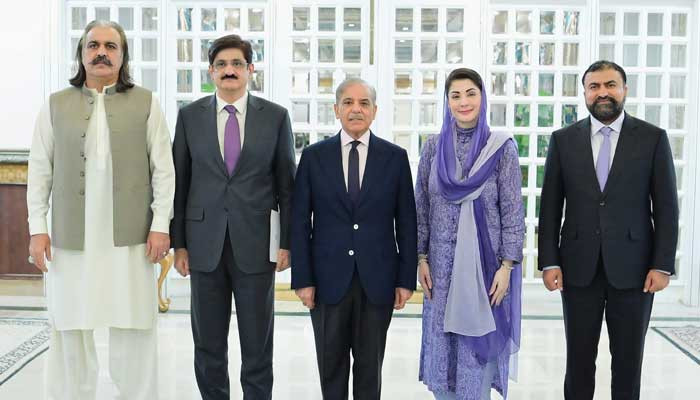CCI Rejects Federal Government’s Canal Proposal
The Council of Common Interests (CCI) has dismissed the federal government’s proposition to construct new canals. This decision effectively reverses the Executive Committee of the National Economic Council’s (ECNEC) resolution from February 7.
A statement released by the Prime Minister’s Office after the CCI meeting affirmed, “No new canals shall be built without comprehensive understanding and consensus among all provinces… The federal government will halt advancement on any strategies until a thorough accord is achieved between the provinces.”
Prime Minister Shehbaz Sharif presided over the session, which was originally scheduled for May 2 but was moved to today at the request of the Sindh government. The meeting addressed the disputable canals project that ignited widespread controversy throughout Sindh.
The council consists of eight members, including the chief ministers from all four provinces. Deputy Prime Minister and Foreign Minister Ishaq Dar, Defence Minister Khawaja Asif, and federal minister Ameer Muqam are also members of the council.
In total, 25 individuals were specially invited to participate in the CCI meeting. The gathering was convened to deliberate on a six-point agenda.
The CCI scrutinized the Sindh government’s agenda point concerning the proposed fresh canal developments.
According to the announcement, the federal government is collaborating with all provincial governments to foster a lasting agreement on agricultural policy and water management infrastructure across Pakistan.
“The policy underscores that the water entitlements of all provinces are safeguarded by the Water Apportionment Accord of 1991 and the Water Policy of 2018, backed by complete stakeholder unanimity,” it further stated.
To resolve provincial issues and secure the nation’s food and ecological integrity, a committee will be established. This body will comprise representatives from the federal government and all provincial administrations.
This committee will propose solutions that are in line with the two consensus documents, aiming to fulfill Pakistan’s future agricultural demands and water usage requirements, as stated in the announcement.
The announcement stressed that water, being a crucial national resource, should be managed through mutual understanding and cooperation, in accordance with the vision of the Constitution’s authors.
“The government is dedicated to resolving all water-related disagreements amicably, ensuring that every province’s concerns are addressed with appropriate diligence,” it added.
Given these discussions, the CCI has opted to retract the provisional ECNEC endorsement granted on February 7, 2024, for the construction of new canals, in addition to the IRSA water availability certificate issued on January 17, 2024.
The Planning Division and IRSA have received directives to pursue further engagement with all stakeholders to guarantee national unity and address any lingering apprehensions until mutual comprehension is attained.
Following the meeting, Khyber Pakhtunkhwa Chief Minister Ali Amin Gandapur informed reporters that a reaffirmed pledge was made to assure equitable water rights for each province.
He verified that during the assembly, the verdict to erect new canals stemming from the Indus River was rescinded. “It has been decided to address issues through collective accord,” he included.
Gandapur also noted that three proposals from Khyber Pakhtunkhwa were sanctioned for inclusion on the agenda of the next CCI meeting. He indicated that a revision of the National Finance Commission (NFC) Award would also feature on the upcoming session’s agenda.
The chief minister further mentioned that the agenda to formally recognize tobacco as an official crop would also be incorporated into the subsequent gathering. He described the inclusion of these proposals as a substantial triumph for the people of KP.
Speaking on a television program, Defence Minister Khawaja Asif stated that the CCI resolved to revisit the canal matter at a later time, ensuring consensus across all provinces.
He conveyed that any fresh undertakings regarding canals would be implemented following a review of water conditions in rivers, contingent upon “100% consent from the provinces”.
“No one’s rights would be compromised. The Sindh government has been urged to clear roadways, as all demands from the protesters have been met,” he elaborated.
Over recent weeks, the Cholistan Canals issue has surfaced as a significant dispute between the Sindh government, led by the Pakistan Peoples Party (PPP), and the federal government, headed by PM Shehbaz Sharif.
The federal government intends to establish six canals on the Indus River to provide irrigation to the Cholistan desert—a scheme opposed by its primary ally, the PPP, alongside other Sindh nationalist factions.
According to government sources, the Cholistan canal project is estimated to cost Rs211.4 billion and facilitate the agricultural use of thousands of acres of uncultivated land, potentially bringing 400,000 acres under cultivation.
Presently, almost all political and religious parties, nationalist groups, civil society organizations, and lawyers are organizing widespread rallies and sit-ins across Sindh in opposition to the contentious plan.
Despite assurances from the premier, the sit-in at the Khairpur Baberlo bypass, protesting the controversial canal project, entered its eleventh day, leading to the suspension of traffic between Sindh and Punjab. Simultaneously, the demonstration at Mangrio Pump near Daharki on the National Highway has persisted for nine consecutive days.
The continuous blockade has severely disrupted the movement of essential commodities, including fuel and food supplies, with trucks and trailers remaining stranded. This has further complicated conditions for commuters and transporters.
Drivers of heavy containers, immobilized due to the demonstration, have reported that their vehicle tires are deteriorating due to the extended halt.



Comments (0)
No comments yet. Be the first to comment!
Leave a Comment